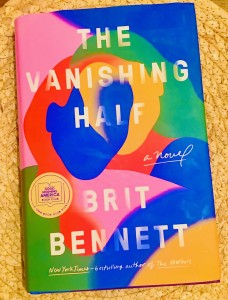As this popular novel opens, a 30-year-old woman returns to her hometown. Residents are shocked to see her, and word quickly travels around that one of the Vignes twins has been spotted. There are two reasons for this outsized reaction, one being that Desiree and her sister Stella have not been seen since they disappeared when they were 16 while everyone else was at the Founder’s Day Dance, dismayed that their mother pulled them out of school to start working as domestic servants. But the greater reason for the town’s shock is the dark-skinned daughter Desiree brings with her, described by the owner of the diner as “blue-black . . . like she flown direct from Africa.”
Mallard, Louisiana is an all-black town, like Eatonville in Zora Neale Hurston’s Their Eyes Were Watching God. Fictional—though based on a real town the author’s mother heard of—Mallard has a peculiar philosophy, created by the town’s founder: the best way to combat racism is to lighten their skin by always having children with lighter- and lighter-skinned people.
By the time of this story, most people in town can pass for white, which is exactly what Stella began doing when she applied for a job in New Orleans. She married a white man and neither he nor their daughter knows Stella grew up identifying as black.
Rebellious Desiree married the darkest-skinned man she could find, hence her daughter Jude’s dark skin. Now, in 1968, only a few weeks after Martin Luther King, Jr.’s assassination, she’s come home with a scarf hiding the bruises on her neck, hoping her husband won’t be able to find her. Unknown to her, he has hired a bounty hunter to find her.
There’s plenty to like about this story. The situation carries dramatic potential: Desiree adjusting to being back in the small town; Jude suffering the prejudice against her due to her skin color; Desiree and her mother trying to find a new connection; Stella wrestling with her reaction when a black family moves into their all-white neighborhood; and the threat of the bounty hunter on top of all that.
I was particularly interested in Stella’s story, having recently read Nella Larsen’s Passing. I’m fascinated by the strain of pretending to be someone you’re not. Of course, it’s not hard, and even fun, to do it for a little while, but to keep it up for years would not only make you feel as though you are always in danger, but would also cut you off from your past. Those memories and the narrative through-line that we create from our life experiences are foundations of our identity, so walling off part of them must have consequences.
There’s another aspect of this story that is fascinating: the hold that the culture we grow up in continues to assert on our actions and reactions, our emotions and desires. We may think we’ve left those childhood beliefs behind, no matter how hard our parents drilled them into us, but they crop up when we least expect it.
As a writer, one thing I’m taking away from this book is the subtle way we can use the works of our literary forebears. In addition to Hurston and Larsen, there are also references to Lorraine Hansberry’s A Raisin in the Sun. If the reader recognizes these works, the references add depth to the story and provide a sense of familiarity. At the same time, the story stands alone; a reader who doesn’t know these works won’t notice the difference.
What underpins the entire story is the one-drop rule, that one drop of black blood makes you black. Of course, that terrible rule was commonly accepted in 1968, so it’s appropriate for the story. However, we still see its effects today in who identifies as white and who as black. There are other aspects of racial prejudice, such as descriptions of people as an Oreo or a snowball, and colorism itself. And of course, the concept of race itself is a social construct. Still, Mallard’s obsession with lightening their skin through successive generations makes me wonder when, if ever, they would consider themselves white. What vanishes? What remains?
Have you read this best-selling novel? What did you think of it?
